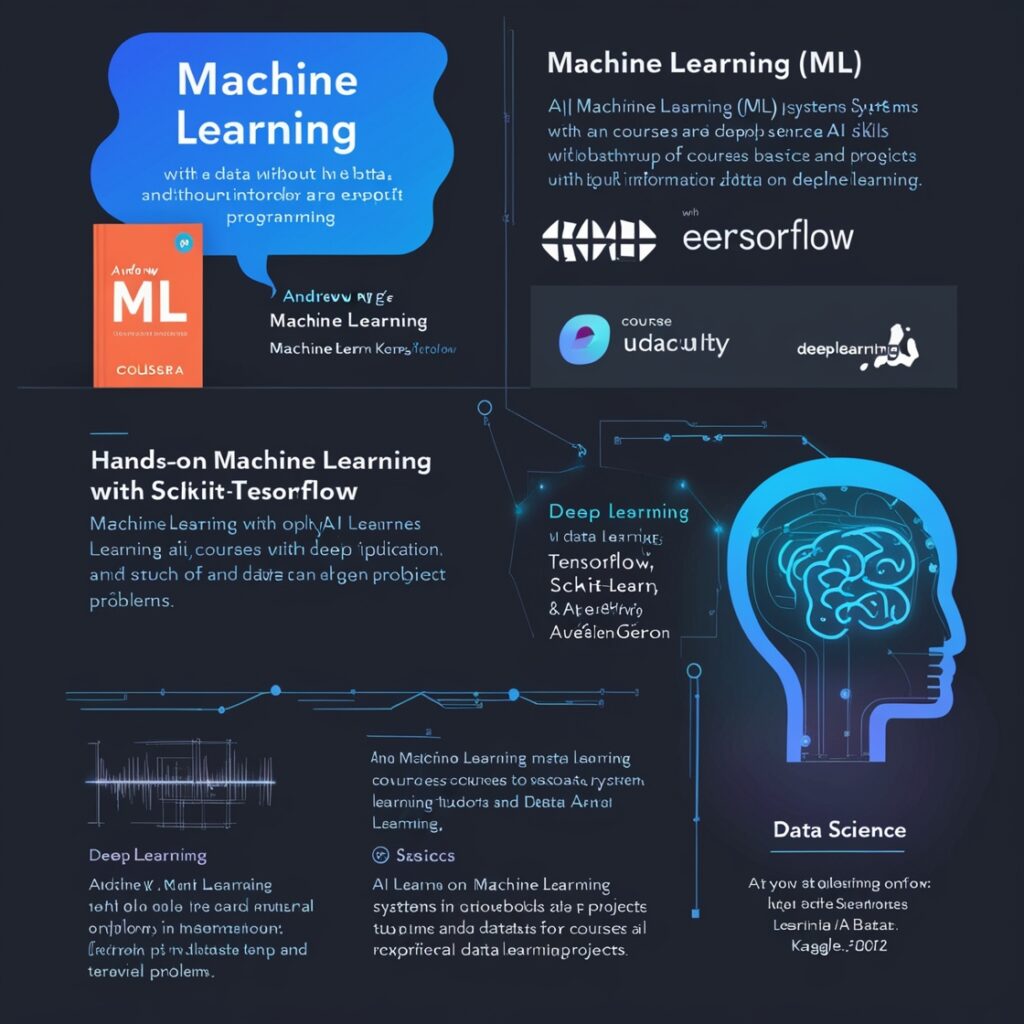Guide to Learning AI
Artificial Intelligence (AI) is no longer science fiction; it’s rapidly changing the world around us. From personalized recommendations on streaming services to self-driving cars, AI’s influence is undeniable. So, if you’re curious about AI learning and becoming a part of this exciting field, you’ve come to the right place! This guide will equip you with the essential knowledge and resources to embark on your AI learning journey.

Building a Strong Foundation:
Before diving headfirst into complex algorithms, it’s crucial to establish a solid foundation. Here’s what you need to focus on:
- Mathematics: AI is heavily reliant on math concepts like linear algebra, calculus, probability, and statistics. These skills will help you understand the algorithms and models that power AI systems. Resources like Khan Academy or online courses on platforms like Coursera can be excellent starting points.
- Programming: AI development relies heavily on programming languages like Python. Python’s readability and vast libraries for AI and data science make it a popular choice. Start with online tutorials or beginner-friendly books to learn the basics of programming.
Unlocking the Secrets of AI:
Once you have a grasp of the fundamentals, it’s time to delve into the core concepts of AI:

- Machine Learning (ML): This is the foundation of most AI systems. ML allows algorithms to learn from data without explicit programming. Resources like Andrew Ng’s “Machine Learning” course on Coursera or books like “Hands-On Machine Learning with Scikit-Learn, Keras & TensorFlow” by Aurélien Géron can introduce you to the principles of ML.
- Deep Learning: A subfield of ML, deep learning utilizes artificial neural networks, inspired by the structure and function of the human brain, to process information and solve complex problems. Libraries like TensorFlow and PyTorch are widely used for deep learning projects. You can explore courses on platforms like Udacity or online tutorials by deeplearning.ai to understand deep learning concepts.
- Data Science: AI thrives on data! Data science encompasses the skills necessary to collect, clean, analyze, and interpret large datasets. Platforms like Kaggle offer datasets for practice, and online courses on data science basics can equip you with the essential tools.
Practice Makes Perfect:
Learning by doing is paramount in AI. Here’s how to put your knowledge to the test:
- Personal Projects: Choose projects that align with your interests. From building a recommendation system to training an image classifier, the possibilities are endless. Kaggle competitions offer a platform to practice and compete with other aspiring AI enthusiasts.
- Open-Source Contributions: Explore existing open-source AI projects on platforms like GitHub. Contributing to these projects allows you to learn from experienced developers and gain valuable real-world experience.
- Online Communities: Engage with online communities like forums and discussion boards dedicated to AI. Here, you can connect with peers, learn from others’ experiences, and ask questions.
Beyond the Basics: Exploring Specialized Areas:
As you gain experience, you can specialize in specific areas of AI that pique your interest:
- Computer Vision: This field focuses on training machines to analyze and understand visual information.
- Natural Language Processing (NLP): NLP allows machines to understand and process human language, enabling applications like chatbots and sentiment analysis.
- Robotics: This field combines AI with engineering to create intelligent robots that can interact with the physical world.
Continuous Learning:
The field of AI is constantly evolving. Here’s how to stay up-to-date and sharpen your skills:
- Follow AI Blogs and Publications: Several excellent blogs and publications, such as “Machine Learning Mastery” or “The Gradient,” offer insights and updates on the latest AI advancements.
- Attend AI Conferences and Events: Participating in AI conferences and events allows you to network with experts, learn about cutting-edge research, and stay ahead of the curve.
- Take Advanced Courses and Workshops: As you progress, consider enrolling in specialized courses or workshops that delve deeper into specific aspects of AI.


